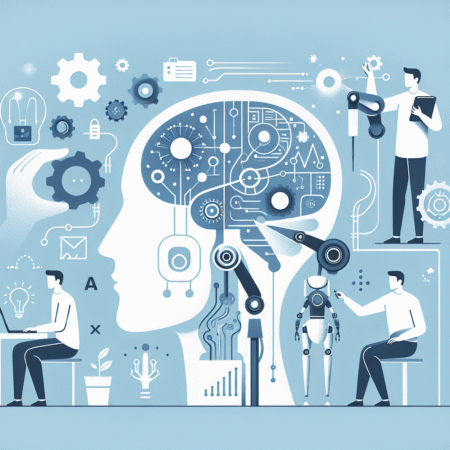Unlocking the Mysteries of Artificial Intelligence
What if your next best friend is a machine? This question might sound far-fetched, but as we dive deeper into the world of artificial intelligence (AI), it becomes more relevant every day. “Mind Machines: How AI is Learning to Think Like Us” explores the fascinating and often perplexing relationship between human thought and machine learning.
Imagine a world where machines not only solve problems but also understand emotions. This book takes us on a journey through the evolution of AI, highlighting how these “mind machines” are beginning to mirror our own thinking processes. It raises profound questions about what intelligence really means.
The Symbiosis of Human Thought and AI
AI works through algorithms, neural networks, and vast data sets. Think of algorithms as recipes that guide machines on how to think. Neural networks act like the human brain, processing information in structured layers. In essence, they learn from patterns and experiences, evolving from simple calculators to complex systems capable of recognizing emotions.
For example, consider your personal assistant, like Siri or Alexa. These tools learn your preferences and adapt their responses to better cater to your needs. They mimic human-like interactions, showcasing how far AI has come. But with these advancements arise challenges.
The book emphasizes the dual-edged sword of AI’s growth. While it presents groundbreaking opportunities—from enhancing medical diagnoses to providing personalized education—it also poses threats. Issues of privacy arise as machines collect our data to learn. What does this mean for our privacy? AI’s ability to recognize faces could impact our security and civil liberties.
Moreover, as AI infiltrates job markets, it transforms employment landscapes. Traditional roles change or disappear, leaving us to ask: how do we redefine our roles in a world increasingly shared with machines?
Big Questions for the Future
What does it mean to be intelligent? If machines begin to think like us, do they deserve the same moral considerations? These questions lead us to rethink ethics. Do we owe responsibilities to AI that develops consciousness? As humans push the limits of technology, we must ask ourselves how to navigate this ethical minefield.
The societal impacts are equally important. Machines can enhance productivity, but at what cost? Many fear a future where personal interactions diminish because of AI’s encroachment into our everyday lives.
Experts provide insights that challenge our perceptions. Philosopher John Searle argues that even advanced AI lacks true understanding. Meanwhile, AI ethicists warn about the dangers of autonomous systems making life-or-death decisions.
As you ponder these questions, reflect on your attitude toward technology. Are you excited by the possibilities or wary of the consequences?
The narrative around AI is not just about machines. It’s about us—our values, our aspirations, and what we believe intelligence to be. As we stand on the brink of a new era dominated by artificial intelligence, your thoughts and actions can shape the journey ahead.
So, engage in discussions, seek out more information, and consider what role you wish to play in this unfolding story. Your perspective matters as we move into a future intertwined with machines that think, learn, and evolve alongside us.
Expand Your Tech Knowledge
Explore the future of technology with our detailed insights on Artificial Intelligence.
Discover archived knowledge and digital history on the Internet Archive.
OPED_V1

